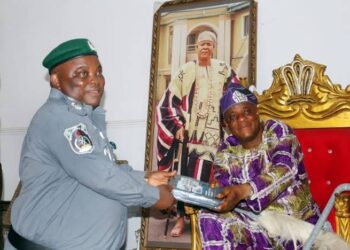In an unprecedented move, Nigeria and the Interregional Coordination Centre for the Implementation of Regional Strategy for Maritime Safety and Security in Central and West Africa (ICC) have announced the formation of a Maritime Collaboration Forum to provide shared awareness and de-confliction of activities in the Gulf of Guinea (GOG-MCF/SHADE). The forum is for all stakeholders, both regional and international.

The announcement comes at a time when pirates continue to wreak havoc in the busy waters of Gulf of Guinea at distances more than 200 nautical miles from Nigeria.
The situation has led several EU countries including France, Spain, Italy, Belgium, and Denmark to announce an interest in contributing to maritime security in the region to suppress the threat posed by Nigerian pirates. Recently the Italian Navy has, on more than one occasion, disrupted pirate attacks and the Danish government has committed to send a frigate on a five-month antipiracy patrol in the Gulf of Guinea from November 2021.
The SHADE model has already demonstrated its worth as a model for exchange of information between regional and non-regional military forces in countering the Somali piracy threat.
Reacting to the initiative, David Loosley, Secretary General and CEO of BIMCO said, “the establishment of GOG-MCF/SHADE will enable working-level stakeholders from the GoG region and from outside the region to connect and discuss how best to suppress Nigerian piracy. We think this can be a catalyst for non-regional navies to step up and initiate effective maritime law enforcement operations to support regional efforts. Such operations should of course respect Nigeria’s sovereign rights as defined under UNCLOS; in respect of piracy, this is within Nigeria’s territorial waters”.
According to Jakob Larsen, BIMCO’s Head of Maritime Safety & Security, even relatively small initiatives could make a big difference in improving security in the region.
“We repeat our call for non-regional stakeholders to actively engage in antipiracy law enforcement in the Gulf of Guinea in support of this important regional initiative. The area in the Gulf of Guinea where pirates operate is small compared to the area dominated by Somali pirates a few years ago. It would only take a small, effective force (estimated two frigates and one maritime patrol aircraft) to provide a credible deterrent as well as an enhanced response capability,” Larsen says.
In the past, BIMCO and other stakeholders have raised concerns certain Nigerian stakeholders have so far not fully committed to the fight against piracy because of the significant moneys flowing from the booming commercial asset protection industry. Commenting on the risk of the GOG-MCF/SHADE becoming just an instrument to restrict international navies’ antipiracy operations and further bolstering the Nigerian protection industry, Larsen says:
“At BIMCO we are confident this initiative really is a paradigm shift in Nigeria’s approach to piracy, but of course the proof is in the pudding. I must say, we are very optimistic.”
“The GOG-MCF/SHADE has great potential and will hopefully also stimulate new solutions like embarkation of law enforcement officials from the GoG region in non-regional naval ships, establishment of mechanisms for handover to regional jurisdictions of suspected pirates, utilisation of available radar data from offshore installations, and so on. There are so many low-hanging fruits just waiting to be picked,” says Larsen.
















Discussion about this post